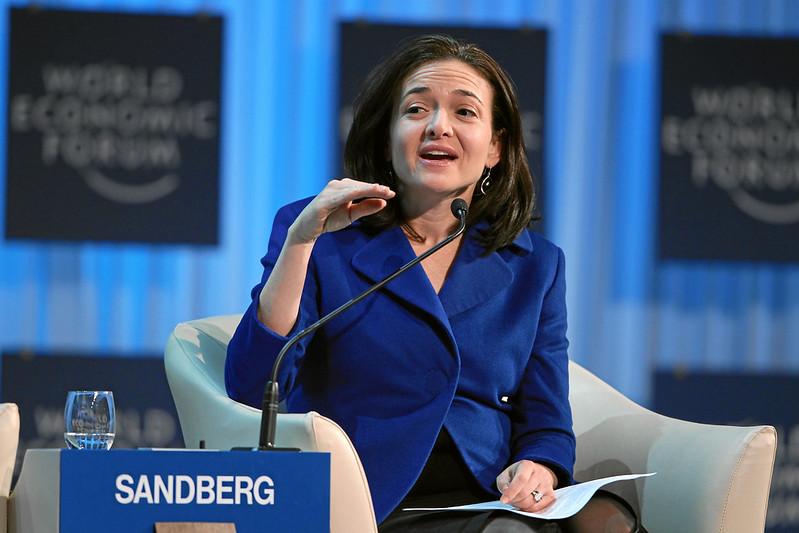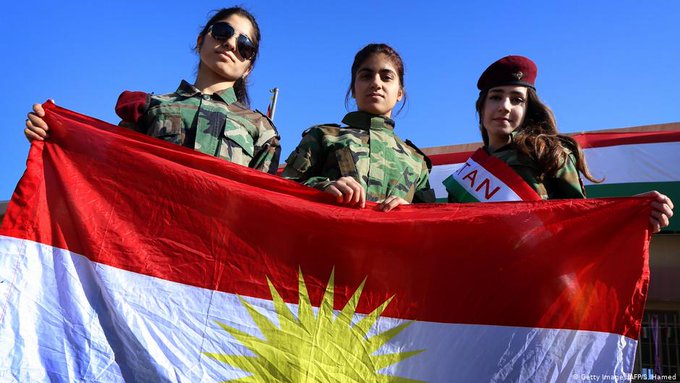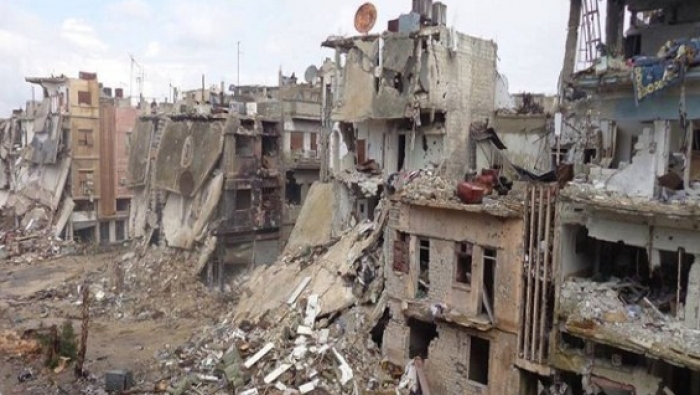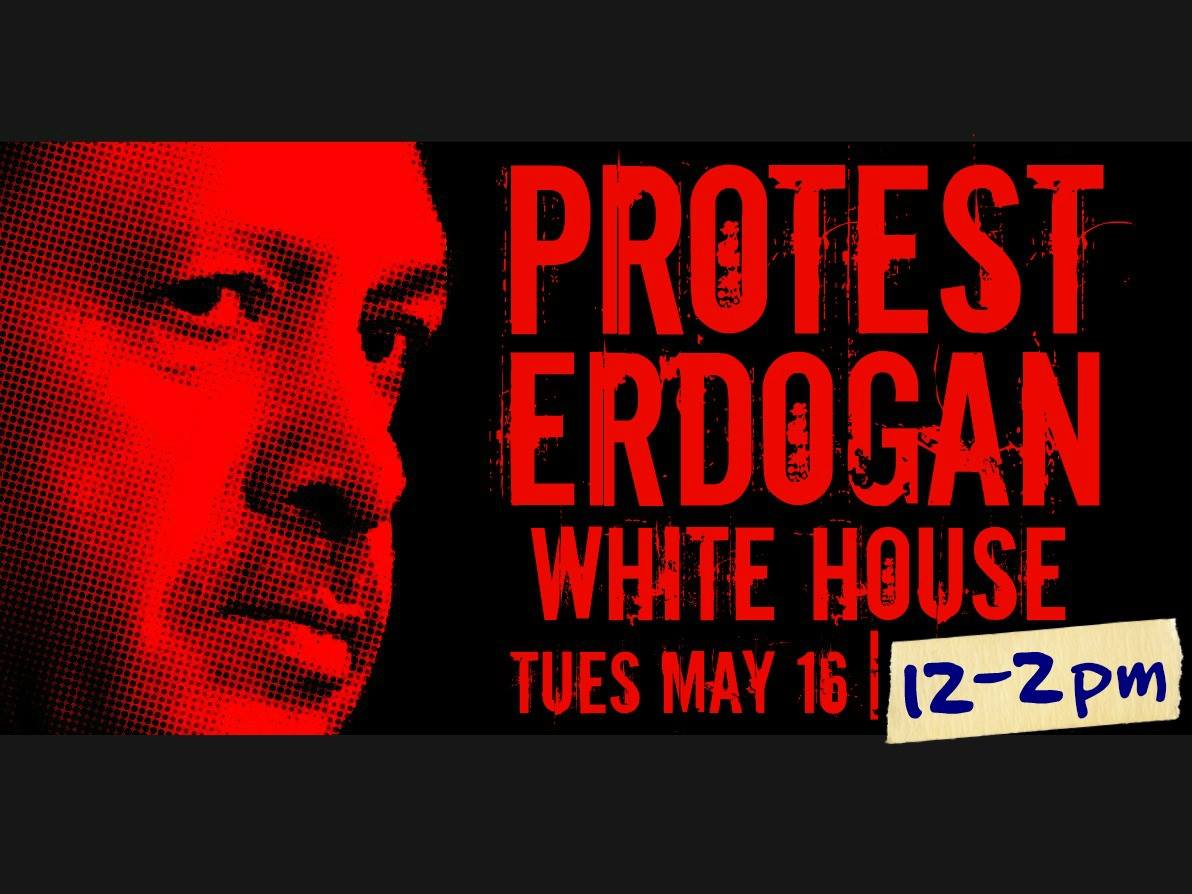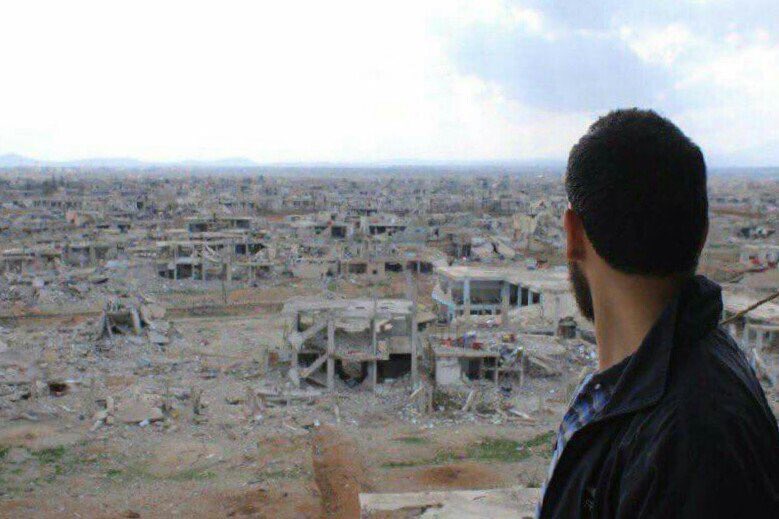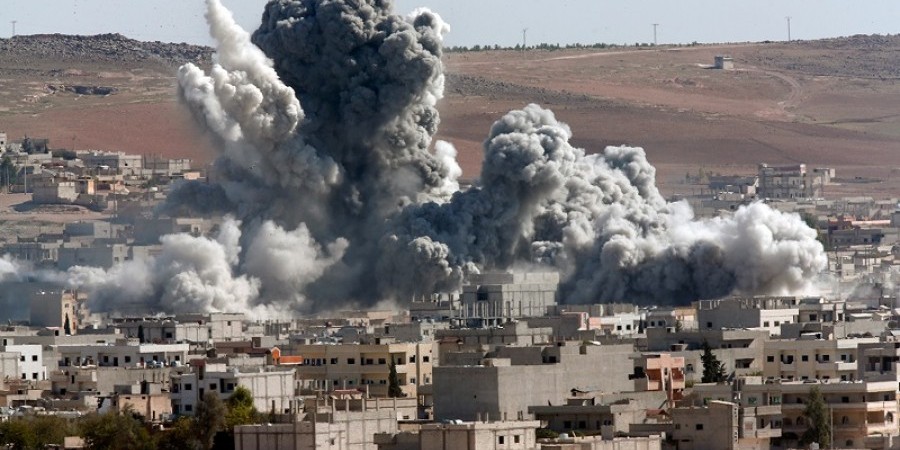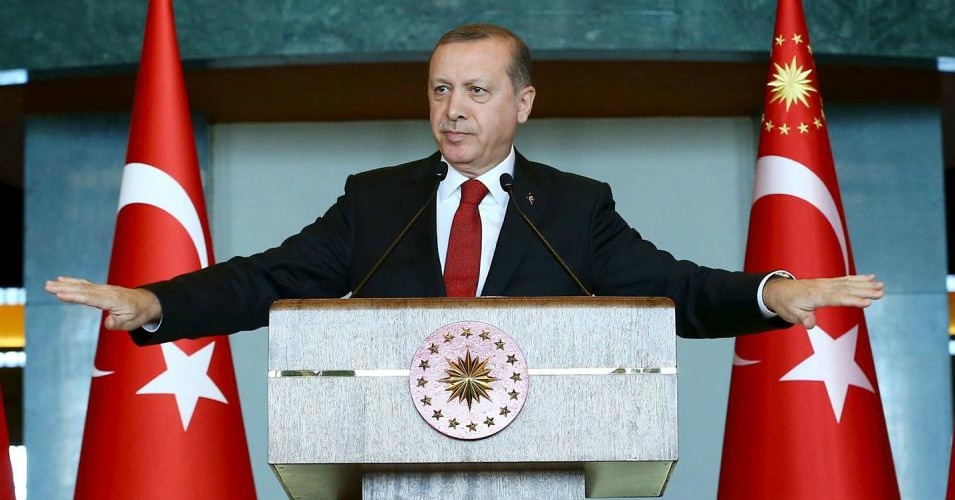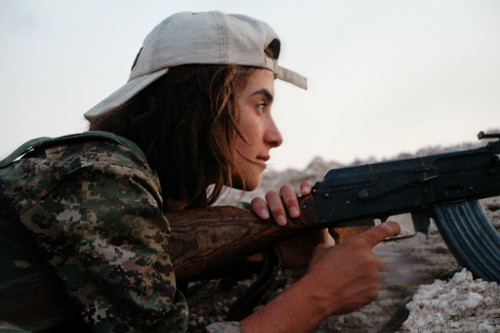Having suffered a traumatic genocide, Yazidi women on Mount Sinjar mobilize their autonomous armed and political resistance with the PKK’s philosophy.
By Dilar Dirik. Published 8-23-2015 by ROAR Magazine.

The old Kurdish saying “we have no friends but the mountains” became more relevant than ever when on August 3, 2014, the murderous Islamic State group launched what is referred to as the 73rd massacre on the Yazidis by attacking the city of Sinjar (or Shengal, in Kurdish), slaughtering thousands of people, and raping and kidnapping the women to sell them as sex slaves.
Some 10,000 Yazidis fled to the Shengal mountains in a death march in which many, especially children, died of hunger, thirst and exhaustion. This year on the same day, the Yazidis marched in the Shengal mountains again. But this time in a protest to vow that nothing will ever be the same again.
Last year, the Iraqi Kurdish peshmerga of the Kurdistan Democratic Party (KDP) promised the people to guarantee Shengal’s safety, but ran away without warning when IS attacked, not even leaving arms behind for people to defend themselves. Instead, it was the guerrilla of the Kurdistan Workers’ Party (PKK), as well as the the Kurdish People’s Defense Units (YPG) and its women’s brigade (YPJ) from Rojava, who — in spite of carrying just Kalashnikovs and being only a handful of fighters — opened a corridor to Rojava, rescuing 10,000 people.
For an entire year, the Yazidi women have been portrayed by the media as helpless rape victims. Countless interviews repeatedly asked them how often they were raped and sold, ruthlessly making them relive the trauma for the sake of sensationalist news reporting. Yazidi women were presented as the embodiment of the crying, passively surrendering woman, the ultimate victim of the Islamic State group, the female white flag to patriarchy. Furthermore, the wildest orientalist portrayals grotesquely reduced one of the oldest surviving religions in the world to a new exotic field yet to be explored.
Ignored is the fact that Yazidi women armed themselves and now mobilize ideologically, socially, politically and militarily with the framework laid out by Abdullah Öcalan, leader of the PKK. In January, the Shengal Founding Council was established by Yazidi delegates from both the mountain and the refugee camps, demanding a system of autonomy independent of the central Iraqi government or the KRG.
Several committees for education, culture, health, defense, women, youth, and economy organize everyday issues. The council is based on democratic autonomy, as articulated by Öcalan, and has met with harsh opposition by the KDP, the same party which fled Shengal without a fight. The newly-founded YBŞ (Shengal Resistance Units), the all-women’s army YPJ-Shengal and the PKK are building the front-line against the Islamic State group here, without receiving any share of the weapons provided to the peshmerga by international coalition forces. Several YBŞ and council members were even arrested in Iraqi Kurdistan.

Photo by Dilar Dirik.
On July 29, women of all ages made history by founding the autonomous Shengal Women’s Council, promising that “the organization of Yazidi women will be the revenge for all massacres.” The women decided that families must not intervene when girls want to participate in any part of the struggle and committed to internally democratizing and transforming their own community. They do not want to simply “buy back” the kidnapped women, but liberate them through active mobilization by establishing not only a physical, but also a philosophical self-defense against all forms of violence.
The international system insidiously depoliticizes people affected by war, especially refugees, by framing a discourse to render them without will, knowledge, consciousness and politics. Yet the Yazidi refugees on the mountain and in the Newroz camp in Dêrîk (al-Malikiyah), which was created in Rojava immediately after the massacre, insist on their agency. Though some international organizations provide limited aid now, almost no aid was able to cross to Rojava for years as a result of the KRG-imposed embargo.
The people at Newroz Camp told me that in spite of attempts by the Office of the United Nations High Commissioner for Refugees to model the camp and its educational system according to its top-down vision, the camp’s assembly resisted, forcing one of the biggest international institutions to respect its own autonomous system. Now, education in literacy, art, theater, culture, language, history and ideology are taught across ages, while commune-like units organize daily needs and issues in Dêrîk and Shengal.
“With all these councils, protests and meetings, the resistance may seem normal. But all of this emerged within a year only, and for Shengal. This is a revolution,” one Yazidi PKK fighter said. “The atmosphere of Rojava has reached Shengal.”
Hedar Reşît, a PKK commander from Rojava who teaches the sociology of Shengal before and after the latest genocide, was among the seven people who fought the Islamic State group at the beginning of the massacre and was wounded opening the corridor to Rojava. The presence of women like her from four parts of Kurdistan enormously impacts the Shengal society.
“For the first time in our history we take up arms, because with the last massacre we understood that nobody will protect us; we must do it ourselves,” I was told by a young YPJ-Shengal fighter, who renamed herself after Arîn Mîrkan, a martyred heroine of the resistance of Kobane.
She explained how girls like herself never dared to have dreams and only sat at home until they got married. But like her, hundreds have now joined the struggle, like the young woman who cut off her hair, hung the braid on her martyred husband’s grave, and joined the resistance.

Photo by Dilar Dirik.
The physical genocide may be over, but the women are conscious of a “white” or bloodless genocide, as EU governments — especially Germany — try to lure Yazidi women abroad, uprooting them from their sacred homes and instrumentalizing them for their own agendas.
Mother Xensê, member of the women’s council, kisses her granddaughter and explains: “We receive armed training, but ideological education is far more important for us to understand why the massacre happened and what calculations people make at our expense. That is our real self-defense. Now we know that we were so vulnerable because we were not organized. But Shengal will never be the same again. Thanks to Apo [Abdullah Öcalan].”
A Yazidi woman herself, Sozdar Avesta, a presidency council member of the Union of Communities in Kurdistan (KCK) and a PKK commander, elaborates:
It is not a coincidence that the Islamic State group attacked one of the oldest communities in the world. Their aim is to destroy all ethical values and cultures of the Middle East. In attacking the Yazidis, they tried to wipe out history. The Islamic State group explicitly organizes against Öcalan’s philosophy, against women’s liberation, against the unity of all communities. Thus, defeating the group requires the right sociology and history-reading. Beyond physically destroying them, we must also remove IS’ ideology mentally, which also persists in the current world order.
One year ago, the world watched the unforgettable genocide of the Yazidis. Today, the same people who — while everyone else ran away — rescued the Yazidis, are now being bombed by the the IS-supporting Turkish state, with the approval of NATO. When the states that contributed to the rise of IS promise to defeat it and destroy the social fabric of the Middle East along the way, the only survival option is to establish autonomous self-defense and grassroots democracy.
As one drives through the Shengal Mountains, the most beautiful indicator of the change that hit this wounded place within a year are the children on the streets, who whenever heval — “the comrades” — drive by chant: “Long live Shengal’s resistance! Long live the PKK! Long live Apo!”
Thanks to democratic autonomy, the children who once opened their tiny hands and asked for money when peshmerga fighters drove by now raise the same hands to fists and victory signs.
Dilar Dirik is part of the Kurdish women’s movement. She is a writer and PhD student at the Department of Sociology, University of Cambridge.
